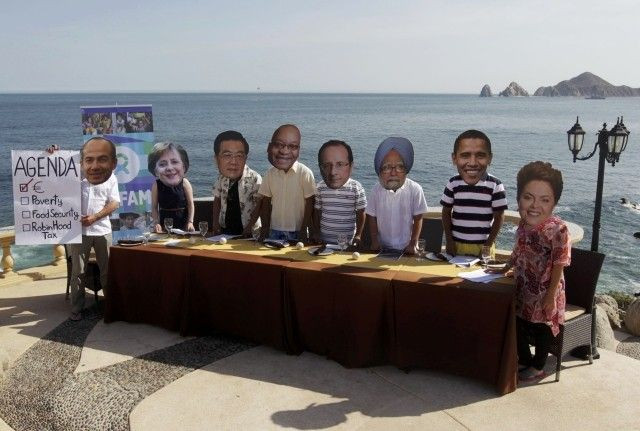BRICS To Unveil Major Increase In European Bailout Aid

Ahead of the opening of the G-20 meeting of heads of state in Los Cabos, Mexico, it is more apparent than ever that economic initiative in the world has shifted from the Atlantic to the Pacific, from North to South and from West to East.
The G-20 Summit in Los Cabos, which looks out onto the Pacific Ocean from the Baja Peninsula, will take place over the next two days (June 18-19) and is widely expected to address how to renew strength and confidence in the global financial system.
A number of European governments are anticipating the news that billions of new loans from the BRICS emerging economies will be used to prop up their debt-ridden financial systems.
China, India, Russia, Brazil and South Africa are expected to meet on Monday ahead of official G-20 proceedings to discuss the infusion of at least a further $60 billion into the new International Monetary Fund, or IMF, bailout to support heavily indebted euro zone states. The U.S. has so far refused to provide any money for the initiative.
The BRICS contribution is expected to push the new IMF firewall package to around $430 billion on Monday after the release of their final figures.
But if that looks like the U.S. is turning its back on European partners, China has been quick to provide soothing, although largely vague, words on cooperation and commitment to the EU's economic stability.
That, of course, makes sense, considering that the EU region has been China's largest trading partner since 2006, meaning a further deepening of the crisis there could have serious repercussions for China even if the general global economy appears to be in heading into recovery.
Chinese President Hu Jintao mentioned in an interview to the Mexican newspaper Reforma on Sunday that in the current world economic environment, the G-20 members should stick together in difficult times and pursue win-win cooperation.
Indeed, the Chinese leader had directed warnings against an embryonic atmosphere of economic protectionism.
We should continue to oppose protectionism in all forms and advance the Doha [Qatar] round negotiations. We should continue to give high priority to development and promote growth of developing countries so as to increase total global demand, said Hu.
The Chinese president urged the G-20 to address the euro zone crisis as a unified group in a constructive and cooperative way and to encourage and support efforts made by Europe to resolve it and send a signal of confidence to the market.
Robert Zoellick, the outgoing head of the World Bank, said on Sunday that Europe may be able to muddle through but the risk is rising. He also warned that there could be a Lehman moment if things are not properly handled, referring to the collapse of Lehman Brothers in late 2008 and its devastating aftermath.
On Monday, the Chinese foreign ministry noted ahead of Greek election results that China still supports efforts to resolve ... sovereign debts issues in the EU and euro zone. We are confident [about] the EU and the euro zone.
Responding to whether the G-20 would take tougher action to tackle the problems in Greece last Wednesday, the Chinese government said that: The [G-20] Summit should affirm that and express G-20 countries' confidence in European economic and financial stability. The Greek debt issue is an internal affair of the EU. If the developments of the situation affects international economic and financial stability, the international community should pay necessary attention and offer help.
But the emerging markets have their own slew of economic troubles.
Chinese and Indian economies only grew by 8.1 and 5.3 percent, respectively, over 2011 -- amazing rates by European standards, but lower than original expectations and now thought to indicate a wider slowdown in both countries.
Analysts now expect both Beijing and New Delhi to embark on new spending plans to boost growth rates through investment in infrastructure.
The latter unveiled a plan in early June for some $1 trillion in new spending, from public and private funding, to build new roads, harbors and airports in the country.
Indian Prime Minister Manmohan Singh said on June 6 that achieving targets in key infrastructure sectors is key to success and will inspire confidence about the overall economic growth rate.
Comments from the Chinese government at the end of May revealed that it was now considering another stimulus package, though much smaller than the 4 trillion yuan ($629 billion) behemoth spending plan that pushed up inflation and public debt in 2008.
Hu also noted on Sunday that China will continue to pursue a proactive fiscal policy and prudent monetary policy and maintain a balance between ensuring steady and robust growth, adjusting economic structure and managing inflationary expectations.
© Copyright IBTimes 2024. All rights reserved.




















